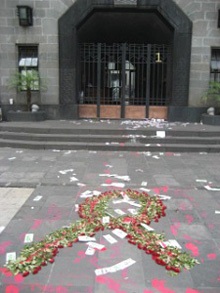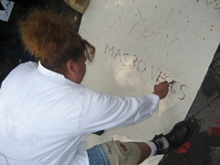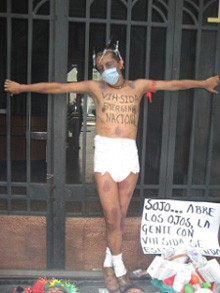
|
 |
 |
 Health & Beauty | June 2008 Health & Beauty | June 2008  
AIDS Activists March in Mexico City
 Business Wire Business Wire
go to original


| | AIDS activists, marching in Mexico City to demand a national state of emergency over drug prices and access in Mexico, laid ten foot-long AIDS ribbons in red roses in front of the Ministry of Health building. (Business Wire) | 
| | An AIDS activist dressed in medical garb writes the coalition call to action on a canvas square written in her own blood (which was drawn on the street during the middle of the demonstrations by a doctor in the march). (Business Wire) | 
| | A "crucified" AIDS activist with the words "VIH/SIDA emergencia nacional" scrawled across his abdomen wears a crown of hypodermic needles. At both the Ministry of the Economy and the Ministry of Health, he dramatically draped himself across the barred entry gates to each location, to show how many Mexican AIDS activists and advocates believe the apathy and inaction from the government becomes a death sentence for many of those living with HIV/AIDS. (Business Wire) | | |
Mexico City - A group of over 150 AIDS Mexican advocates and activists held a passionate protest and advocacy march Friday in Mexico City to demand that Mexico’s Secretary of Health declare a national state of emergency for HIV/AIDS due to the steep cost and limited availability of lifesaving antiretroviral drugs throughout Mexico. AIDS Healthcare Foundation (AHF) the largest US-based AIDS group and operator of free AIDS treatment clinics in the US, Africa, Asia and Latin America/Caribbean — including three free clinics in Mexico (Cancun, Puerto Vallarta, Tuxtla Gutiérrez and Pachuca) joined the broad-based coalition of over 60 groups and non-government organizations in the “Coalition of Activists for Universal Access” that spearheaded the march and protest.

On Tuesday, June 17, the coalition also published a full page open letter with the call to action in La Jornada, one of the largest circulation papers in Mexico. The letter, signed by over 60 individuals and group, was addressed to Dr. Jose Angel Cordova Villalobos, Secretary of Health for the Government of Mexico, called upon the Secretary to declare a national state of emergency for HIV/AIDS. The letter noted that Mexico, which will host the XVII International AIDS Conference later this summer (August 3-8), has as unique opportunity to demonstrate to the world and international community advances that Mexico has taken in the reduction of the prices of AIDS drugs should the Health Minister act in response to the coalition’s demands.

“We call on our Secretary of Health to declare a national state of emergency for HIV/AIDS in Mexico in order that AIDS drug treatments — including generic drugs which are usually much less expensive — can become far more available throughout Mexico and that more people in need can access lifesaving AIDS care and antiretroviral treatment,” Dr. Patricia Campos, Chief of AIDS Healthcare Foundation’s Latin American Bureau and one of the primary organizers of the march.

“At present, only about 38,000 people of the 180,000 people known to be living with HIV/AIDS in Mexico are on treatment. We simply must do more to ensure our people in need have access to affordable lifesaving AIDS drugs, and as the world AIDS community and international media prepare to come to Mexico for the International AIDS Conference in August, we believe it is a perfect time for the Mexican Government to step up its efforts to care for people in need.”

“The Street Brigade for the Support of Women ‘Elisa Martinez’ A.C. is participating in the Activist Coalition for Universal Access, because its members are convinced that an individual’s health should not be treated like a commodity and the country governments should not play the role of managers of transnational pharmaceuticals by maximizing their profits based on patent protection, thereby issuing a sure death sentence for persons living with HIV and AIDS who are not ‘entitled’ to antiretroviral treatment because of insufficient economic resources,” said Jaime Montejo, Coordinator of the independent News Agency Noti-Calle.

“The humanitarian solution of this situation lies in the hands of the Mexican political class, declaring a public health emergency for HIV/AIDS in order to guarantee the universal access to antiretroviral drugs, viral load testing, CD4 counts, HIV genotype studies, HIV/AIDS tests (respecting their voluntary and confidential nature and subject to informed consent), treatment of opportunistic diseases, condoms, water based lubricants, information, correct and non-discriminatory treatment.

In the short term, a declaration of a national state of emergency would facilitate the conditions so that people living with HIV or AIDS could obtain testing and treatment services, thereby transforming universal access to ARVs into a sustainable HIV prevention strategy as well.”

Yesterday’s march began in the Garden of Composers park in Mexico City. The group marched a short distance to the national headquarters for Ministry of the Economy where a brief protest and rally were held. Several members of the group then presented a manifesto with the coalition’s call to action to Ministry officials. The activists then proceed to march — with a full and courteous police escort — to the Mexican Secretary of Health’s national headquarters about one kilometer away. There the group also held a lively demonstration in front of the building while waiting to see if an official member of the Health Ministry would meet with them to listen to their demands.

After about one-half hour, three members of the coalition were invited in to meet with Dr. Gabriel R. Maneull Lee, Secretario Particular del C. Secretario de Salud, to discuss the prices of AIDS drugs in Mexico and government regulations that discourage the importation of, or production of generic AIDS medications in Mexico.

Among the many activists marching were protesters who included:

• The laying out of a ten foot long AIDS ribbon in red roses in front of the Ministry of Health building;

• Several activists dressed in medical garb who were writing the coalition call to action on a canvas square written in their own blood (which was drawn on the street during the middle of the demonstrations by a doctor in the march);

• A “crucified” AIDS activist with the words “VIH/SIDA emergencia nacional” scrawled across his abdomen who was also wearing a crown of hypodermic needles. At both the Ministry of the Economy and the Ministry of Health, he dramatically draped himself across the barred entry gates to each location, to show how many Mexican AIDS activists and advocates believe the apathy and inaction from the government becomes a death sentence for many of those living with HIV/AIDS.

Certain world bodies classify Mexico as a middle-income country using Gross National Income (GNI) as its measure. The country has a per capita income of roughly USD $7,310; however, AIDS drug treatments that can cost as little as USD $150 in what are designated least-developed or low-income countries in Africa and elsewhere (e.g. Uganda, Malawi) can cost as much as USD $8,000 in Mexico — or about 9.5% more than and average person’s income, making these lifesaving AIDS regimens all but unaffordable to the majority in need there.

This is in part because middle-income countries are usually not proffered the same drug price reductions as low-income countries. However, when it comes to country classification, higher overall average income — middle-income versus low-income — does not necessarily indicate less poverty, and GNI, which divides a country’s total income by its total population to arrive at an estimate of average individual incomes, often obscures the fact that the majority of a country’s citizens may live in poverty.

About AHF: AIDS Healthcare Foundation (AHF) is the nation’s largest non-profit HIV/AIDS organization. AHF currently provides medical care and/or services to more than 70,000 individuals in 22 countries worldwide in the US, Africa, Latin America/Caribbean and Asia. Additional information is available at www.aidshealth.org | 
 | |
 |



